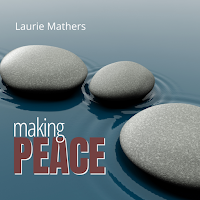Making Peace
The early church was riddled with conflict, both external and internal. They were persecuted by unbelieving Jews and Gentiles alike, and relationships within the church mirrored this tension. Christians were pressured to behave more like Jews to relieve the pressure from the Jews or, conversely, to behave more like Gentiles to relieve a different set of tensions. And it is in this context of relational struggle that Paul gives us some of the Bible’s richest teaching on peace.
In Ephesians 2, after explaining that all Christians, himself included, were once equally “children of wrath” (2:3) and that they have been saved by God’s grace alone, not by works of their own (2:8-10), Paul addresses his Gentile readers specifically. Calling them “the uncircumcision,” a reminder of the derision they experienced from their Jewish neighbors, he urges them to remember that “at that time” they were “separated from Christ, alienated from the commonwealth of Israel and strangers to the covenants of promise, having no hope and without God in the world” (2:12). In short, before Christ their lives had been characterized by anything but peace.
“But now in Christ Jesus you [Gentiles] who once were far off have been brought near by the blood of Christ. For he himself is our peace, who has made us both one and has broken down in his flesh the dividing wall of hostility by abolishing the law of commandments expressed in ordinances, that he might create in himself one new man in place of the two, so making peace, and might reconcile us both to God in one body through the cross, thereby killing the hostility. And he came and preached peace to you who were far off and peace to those who were near. For through him we both have access in one Spirit to the Father” (Eph. 2:13-17).
Christ is the ultimate peacemaker. He himself is our peace! He literally embodies it. On the cross Christ bore the penalty of our sin in his own body, and in doing so abolished the dividing wall of hostility that separated us all from God and separated Jew and Gentile from each other.
So, what kind of peace is Paul talking about? In this context he is not referring to feelings, per se, but to relationships. Christ reconciles us to God, and in the process, knits us so closely together in his own body that we—Jew and Gentile—become “one new man” instead of two, reconciled to each other.
In his letter to the Colossians, Paul makes a similar point: “For in him all the fullness of God was pleased to dwell, and through him to reconcile to himself all things, whether on earth or in heaven, making peace by the blood of his cross” (Col. 1:19-20). And two chapters later Paul again connects our peace with God to our peace with each other:
“Put on then, as God's chosen ones, holy and beloved, compassionate hearts, kindness, humility, meekness, and patience, bearing with one another and, if one has a complaint against another, forgiving each other; as the Lord has forgiven you, so you also must forgive. And above all these put on love, which binds everything together in perfect harmony. And let the peace of Christ rule in your hearts, to which indeed you were called in one body. And be thankful” (Col. 3:12-15).
God is calling us, first and foremost, to relational peace. And we achieve it by allowing the peace of Christ to be the determining factor in how we think and feel about each other.
But what about that other kind of peace, the peace of mind that can escape us even when our relationships seem to be in order? What about our anxiety? What about our fear? Do the Scriptures ever apply God’s peace to those? Thankfully, the answer is yes! God wants His peace to permeate every aspect of our lives:
“Rejoice in the Lord always; again I will say, rejoice. Let your reasonableness be known to everyone. The Lord is at hand; do not be anxious about anything, but in everything by prayer and supplication with thanksgiving let your requests be made known to God. And the peace of God, which surpasses all understanding, will guard your hearts and your minds in Christ Jesus.
“Finally, brothers, whatever is true, whatever is honorable, whatever is just, whatever is pure, whatever is lovely, whatever is commendable, if there is any excellence, if there is anything worthy of praise, think about these things. What you have learned and received and heard and seen in me—practice these things, and the God of peace will be with you” (Phil. 4:4-9).
This is the Christian remedy for anxiety. When we entrust our fears to him, his peace becomes the bodyguard of our hearts. But don’t miss the connection Paul makes here between anxiety and our “reasonableness” in relationships with others. If you’ve ever suffered from anxiety, you’re well aware of the spill-over effect it has on those around you.
So then, my siblings in Christ, let’s take to heart the words of the apostle and “pursue what makes for peace and for mutual upbuilding,” (Rom. 14:19) knowing that as we do, we are behaving as sons of God, and we are blessed.
“Blessed are the peacemakers,
for they shall be called sons of God.”
Mt. 5:9
This article was originally published here.



Comments